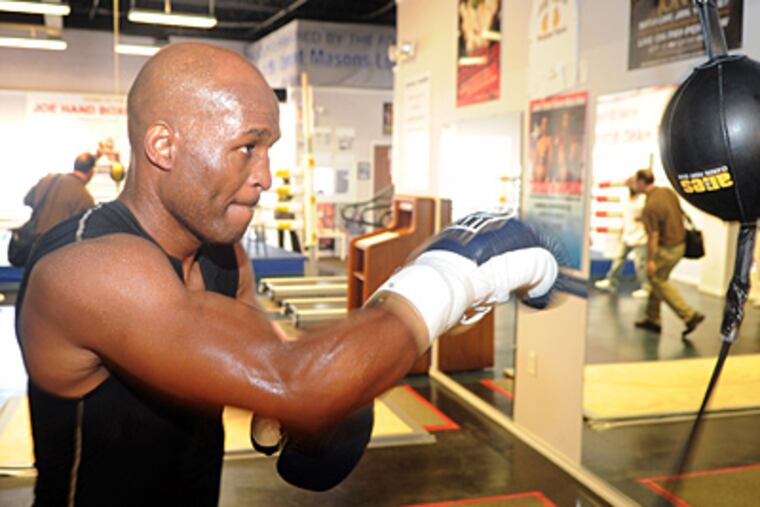What we can learn from older high-level athletes
When a professional athlete in middle age can maintain elite performance, they join a short list. It includes George Blanda, the NFL quarterback and kicker who retired at 48 after 26 seasons; tennis star Martina Navratilova, who won a Grand Slam title two months shy of her 50th birthday; and swimmer Dara Torres, who at 41 earned three silver medals at the Olympics.

When a professional athlete in middle age can maintain elite performance, they join a short list.
It includes George Blanda, the NFL quarterback and kicker who retired at 48 after 26 seasons; tennis star Martina Navratilova, who won a Grand Slam title two months shy of her 50th birthday; and swimmer Dara Torres, who at 41 earned three silver medals at the Olympics.
Then there's boxer Bernard Hopkins, who on Saturday could become the oldest fighter to win a major world title. If Hopkins, who is 46 years and four months old, conquers the 28-year-old Jean Pascal, he'll be 192 days older than George Foreman when he set the record in 1994.
"It's rare that you'll find athletes that can maintain that" high performance level, said Larry Paster, a physical therapist with an orthopedic rehab and sports medicine center in Glenside and a volunteer athletic trainer at the University of Pennsylvania. "That's not a lightweight investment."
Athletes with that kind of longevity possess a rare combination of superior genes and unparalleled motivation, experts said. There are no shortcuts. As a professional athlete, Hopkins' "investment is going to be more intense and more complicated than the average individual who wants to maintain a conditioned body," Paster said.
But when Hopkins, a Philadelphia native, spoke with reporters before a workout last week at Joe Hand Boxing Gym in Northern Liberties, he offered a glimpse into the world of elite, middle-aged athletes and what we can learn from them.
"You invest [in yourself] like you invest in business," Hopkins said before he launched into a workout that included pummeling a speed bag and rapidly jumping rope. "I invested in myself in my 20s and 30s."
The boxer has been a longtime advocate of a healthy lifestyle, Paster said. "He is the perfect example of somebody who set it up for himself at a young age because he wanted to be a champion," he said. "You have to make a commitment to conditioning, to diet, and to lifestyle."
At last week's interview, Hopkins expanded on that theme, wondering aloud why some people put good gasoline in their cars but barely give a second thought to how they fuel their bodies. "You can buy another car," he said. "You can't buy another you."
Hopkins doesn't smoke or drink, lest the vices impede his performance. Todd Wetzel, the vice chairman of orthopedics and sports medicine at Temple University, said avoiding cigarettes was wise for the athlete because nicotine can slow the healing of fractures and contribute to cardiac-disease risk.
As for alcohol, Wetzel said, moderation matters. "It's OK to have reasonable consumption of alcohol," he said. "You can't say, 'I'm not going to drink for two weeks,' and then go on a binge."
When it comes to diet - a word Hopkins hates - the boxer did divulge a few items on his grocery list. Hopkins shops at Whole Foods, buying fish, whole-grain pasta, and other organic ingredients to prepare his own healthful meals. What you won't find in Hopkins' shopping cart: red meat, pizza, or candy.
"The cleaner your lifestyle, the healthier you're going to be," Paster said. But not everyone needs to be as restrictive as Hopkins.
"You have to look at what you put in your diet," Paster said. "Is there too much of any one thing? Is there too much fat? Are there too many carbohydrates? Is there too much protein?"
For Hopkins, the occasional indulgence means an even-tougher workout. "If you want to give yourself a treat," he said, "you have to go through some pain."
Hopkins uses Philadelphia's landscape as an inspiration for his workouts. He runs Girard Avenue and Boathouse Row, he said, taking his 46-year-old body through the workouts of his 20s. "I'm always sweating."
Not every forty-something needs to pound the pavement for a good workout. Walking and swimming, easy on the bones, joints, and spine, are less likely to cause injury than high-impact sports, Wetzel said. "Age per se is not an impediment to high activity," he said. "It's important to go at it in moderation."
Any investment in the body's conditioning is "a step up from the couch," Paster added. "If you can take that step up, you may actually see yourself in the light that Bernard sees himself."
Keeping up the routine for three months can transform occasional exercise into a habit, Paster said. "As soon as you start," he said, "sometimes it gets addicting."
The takeaway from Hopkins' success? "It's never too late," Paster said.
"Anybody can do it at any time. You don't have to be Bernard Hopkins, but everybody can take his philosophy with them."